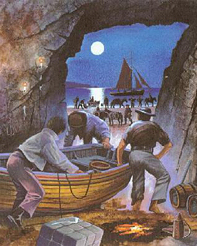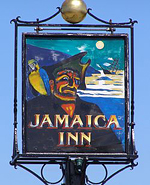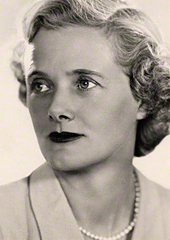Cornish contradictions by Daphne du Maurier
Wed, 01 May 2013 13:23:00 BST
Daphne du Maurier believed Cornish nationalism should look forward not back, yet her novels did entirely the opposite
 SMUGGLERS in the bay, pirates on the seas and wreckers on the cliff tops luring ships to their doom... these are quintessential images of Cornwall, but they were largely the creation of a London-born writer who fell in love with the county and projected it to the wider world.
SMUGGLERS in the bay, pirates on the seas and wreckers on the cliff tops luring ships to their doom... these are quintessential images of Cornwall, but they were largely the creation of a London-born writer who fell in love with the county and projected it to the wider world.
Novels – and the films made from them – such as Rebecca, Frenchman’s Creek and Jamaica Inn – have helped to define Cornwall for readers and moviegoers. They were the work of Daphne du Maurier, a best-selling author who lived from 1907 to 1989. But was Cornishness her greatest creation?
Dr Pete Woodcock, a politics lecturer at the University of Huddersfield, is fascinated by the works of du Maurier. Cornish-born himself, he has begun to research the part she played in constructing the county’s identity.
 He has recently presented a paper entitled Representations of Cornishness in the novels of Daphne du Maurier and a journal article is to follow.
He has recently presented a paper entitled Representations of Cornishness in the novels of Daphne du Maurier and a journal article is to follow.
“In her novels, the cultural view of Cornwall that she presents is quite mythical. She writes a lot about pirates and wreckers and smugglers and all of this has become resonant with Cornwall. But in reality there were no more pirates or wreckers or smugglers in Cornwall than there were in South Wales ... or anywhere with a coast!” said Dr Woodcock. Cornishness is an identity that was created and not discovered, he added, and Daphne du Maurier – whose work he enjoys enormously – played a key role in the process.
 “She was a Londoner, but Cornwall became a place of escape for her as a young woman as she was trying to loosen family ties and make a name as a novelist. She did this in a family house near Fowey and throughout her life saw Cornwall as an escape from London.”
“She was a Londoner, but Cornwall became a place of escape for her as a young woman as she was trying to loosen family ties and make a name as a novelist. She did this in a family house near Fowey and throughout her life saw Cornwall as an escape from London.”
In addition to her novels, du Maurier also wrote non-fiction prose about Cornwall, and contributed to The Cornish Nation, the newsletter of the political party Mebyon Kernow, which campaigns for self-rule. A 1969 du Maurier article was entitled Stand On Your Own Two Feet, although it was a lukewarm argument for Cornish independence, says Dr Woodcock.
He does not expect the emergence of a mass independence movement in Cornwall, although there is a widespread preference to be identified as Cornish rather than English or British and an insistence on cultural differences.
 “The slight irony about Daphne du Maurier is that in her non-fiction works about Cornwall she always talks about the need for authenticity in tourism. She was quite critical of the revival of the Cornish language and Cornish tartan and things like that, believing that Cornish nationalism should look forward not backward. And yet her talk of wreckers, smugglers and pirates has helped build this inauthentic tourist image that she was railing against!” said Dr Woodcock (pictured).
“The slight irony about Daphne du Maurier is that in her non-fiction works about Cornwall she always talks about the need for authenticity in tourism. She was quite critical of the revival of the Cornish language and Cornish tartan and things like that, believing that Cornish nationalism should look forward not backward. And yet her talk of wreckers, smugglers and pirates has helped build this inauthentic tourist image that she was railing against!” said Dr Woodcock (pictured).
“So there are weaknesses in du Maurier’s depiction of Cornishness,” he added. “But there are also immense strengths. Although her view of Cornwall is as a place of escape – from authority from boredom – it is also quite inclusive. There is no doubt that Cornwall is a place that is loved by people who are not Cornish, and that is one of the strengths of Cornwall and Cornishness.”







